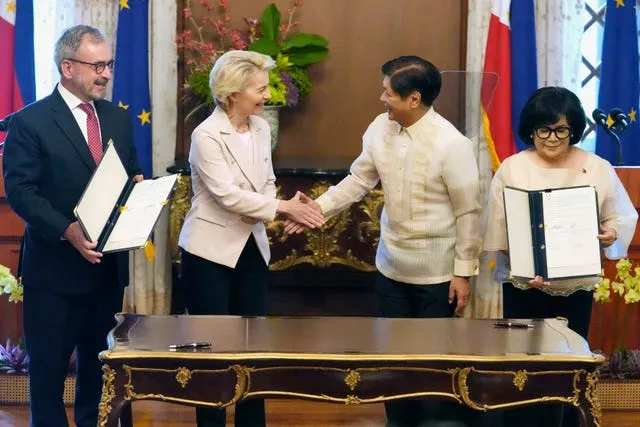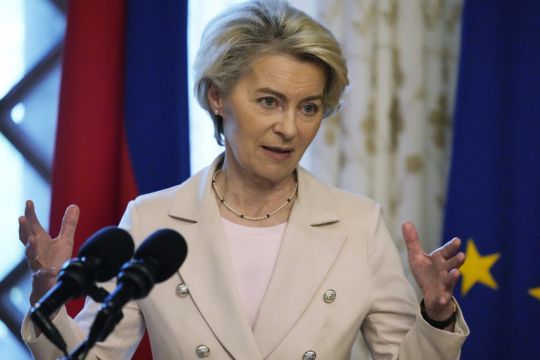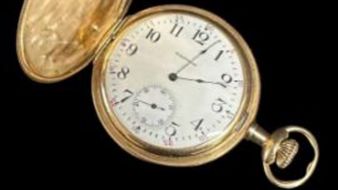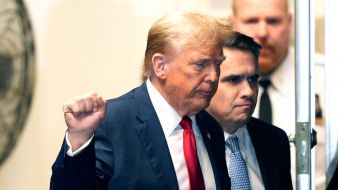European Commission President Ursula von der Leyen warned on Monday that Europe would not tolerate aggression in Ukraine or the Indo-Pacific, as she renewed in a speech the EU’s recognition of a 2016 arbitration decision that invalidated China’s claims in the disputed South China Sea.
Ms Von der Leyen spoke in a joint news conference with Philippine President Ferdinand Marcos Jr after holding talks in Manila that aimed to bolster trade, economic and security relations.
The leaders announced the 27-nation bloc would resume negotiations with the Philippines for a free-trade agreement that stalled in 2017 under Mr Marcos’s predecessor, Rodrigo Duterte.
She underscored the need for security co-operation citing Russia’s invasion of Ukraine, which showed how authoritarian leaders “are willing to act on their threats”.
“Russia’s war of aggression against Ukraine shakes the foundation of the international order. It is in violation of the UN charter and the fundamental principles of international law, such as territorial integrity and sovereignty,” she said.
“This is why Europe supports Ukraine’s brave fight against the aggressor because the illegal use of force cannot be tolerated, not in Ukraine, not in the Indo-Pacific,” Ms von der Leyen said.
“Security in Europe and security in the Indo-Pacific is indivisible. Challenges to the rules-based order in our interconnected world affect all of us.”
“This is why we are concerned about the rising tensions in the Indo-Pacific,” she said, adding that the EU backs a free and open Indo-Pacific “because an Indo-Pacific free of the threats of coercion is key to all our stability to our peace, and to the prosperity of our people”.
Her veiled rhetoric echoed that of US leaders, who have raised alarms over China’s increasingly aggressive actions in the disputed South China Sea.
Without naming China, Ms von der Leyen renewed the EU’s recognition of a decision by a UN-backed tribunal that invalidated China’s territorial claims in virtually the entire waterway on historical grounds.

China has rejected the arbitration decision as a sham and continues to defy it.
The award “is legally binding” and provides the basis for a peaceful resolution of the disputes, Ms von der Leyen said.
The EU is ready to boost cooperation with the Philippines to foster regional maritime security by sharing information, carrying out threat assessments and bolstering the Philippine coast guard, she said.
China has warned the US and its allies against meddling in what it says is a purely Asian dispute.
It has turned seven disputed reefs into missile-protected island bases in the last decade, further alarming Western governments and rival claimants, including the Philippines, Vietnam, Malaysia, Brunei and Taiwan.
Ms Von der Leyen’s visit to the Philippines is a sign of improving ties after a stormy period between the EU and Mr Duterte over human rights. It is the first such top-level visit in nearly six decades of relations with the Philippines.
Mr Marcos and Ms von der Leyen said relations between the EU and the Philippines were entering a new era.
We “are like-minded partners through our shared values of democracy, sustainable and inclusive prosperity, the rule of law, peace and stability, and human rights”, Mr Marcos said in comments that reflected a stark departure from Mr Duterte’s hostile rhetoric against the EU.
The visit came at a time when the EU is assessing whether to extend special trade incentives, including slashed tariffs for a wide variety of products, to the Philippines.
The European Union trade incentives under the so-called Generalised Scheme of Preferences for the Philippines and seven other developing countries are anchored on their adherence to more than two dozen international conventions on human and labour rights, environmental protection and good governance.
But the Philippines came under intense EU criticism during Mr Duterte’s six-year term, mainly because of the bloody anti-drugs crackdown he oversaw that left more than 6,000 mostly petty suspects dead.
Mr Marcos succeeded Mr Duterte in June last year.
The killings sparked an International Criminal Court investigation as a possible crime against humanity.
Mr Duterte withdrew the Philippines from the ICC in 2018, but its prosecutor has proceeded to investigate the widespread deaths that occurred in the years when the country was still part of the court based in The Hague.
Mr Duterte then often lashed at the EU’s criticisms of his brutal anti-drugs crackdown with profanity-laced outbursts.
The EU leader later spoke more bluntly against China at a business forum in Manila, where she warned that Beijing’s increasingly aggressive actions in Asia “could also have global repercussions”.
She criticised China’s stance on the war in Ukraine, its increasingly aggressive actions in disputed Asian waters and its provocative moves against Taiwan.
“China’s show of military force in the South and East China seas and in the Taiwan Strait directly affects Philippines and other partners in the region,” the EU leader said. “But it could also have global repercussions because any weakening of regional stability in Asia…affects global security, the free flow of trade and our own interests in the region.”







